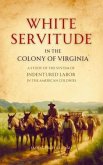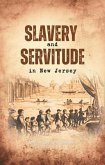"Speaking of the causes which brought white servitude to an end in North Carolina, Dr. John Spencer Bassett...says...the incoming negro slaves...were seen to be cheaper than the white servants." -Booker T. Washington, The Story of the Negro
"Dr. John Spencer Bassett...is well known in the state...deeply interested in North Carolina history and has been a tireless investigator and prolific writer...his best know works on North Carolina are...Slavery and Servitude in the Colony of North Carolina." -The Charlotte Observer, Nov. 15, 1920
"John Spencer Bassett...has devoted especial attention to the study of the race problem...a recognized authority on the subject." -Times Union (Brooklyn), Dec. 3, 1903
"The tragic death of John Spencer Basset, famous historian...was struck by a street car...on...January 27...many of Professor Bassett's books dealt with the question of slavery in his native state, among them being 'Slavery and Servitude in the Colony of North Carolina.'" -The New York Age, Feb. 4, 1928
How similar were white indentured servants in the Colony of North Carolina to the black slaves that eventually replaced them as labor on the plantations of wealthy landowners?
In 1896, John Spencer Bassett (1867- 1928) compares and contrasts black slavery and white servitude in his highly regarded book "Slavery and Servitude in the Colony of North Carolina."
In introducing his book, Bassett writes:
"The lives of the American slaves were without annals, and to a large extent without conscious purpose. To get the story of their existence there is no other way than to follow the tracks they have made in the history of another people. This will be a slow and, in a sense, an unsatisfactory labor. At best it can give but a partial picture of the real life of the slaves, yet it can give all there is to give. Those who in these days of a clearer view and a broader sympathy have come to look on the former bondsmen as a race having their proper place in the evolution of the human family, must be content to gather up as many facts as can be found and to regret that circumstances have made it impossible to obtain a more complete story."
About the author:
John Spencer Bassett was born September 10, 1867, and died January 27, 1928. He was an American historian. He was a professor at Trinity College (today Duke University), and is best known today for the "Bassett Affair" in 1903 when he publicly criticized racism among Southern elites, and called Booker T. Washington, "all in all the greatest man, save General Lee, born in the South in 100 years." Despite widespread outrage, the college trustees refused to accept Bassett's resignation by a vote of 18 to 7. After Trinity, he became a professor of history at Smith College in Massachusetts and was the executive director of the American Historical Association for many years.
"Dr. John Spencer Bassett...is well known in the state...deeply interested in North Carolina history and has been a tireless investigator and prolific writer...his best know works on North Carolina are...Slavery and Servitude in the Colony of North Carolina." -The Charlotte Observer, Nov. 15, 1920
"John Spencer Bassett...has devoted especial attention to the study of the race problem...a recognized authority on the subject." -Times Union (Brooklyn), Dec. 3, 1903
"The tragic death of John Spencer Basset, famous historian...was struck by a street car...on...January 27...many of Professor Bassett's books dealt with the question of slavery in his native state, among them being 'Slavery and Servitude in the Colony of North Carolina.'" -The New York Age, Feb. 4, 1928
How similar were white indentured servants in the Colony of North Carolina to the black slaves that eventually replaced them as labor on the plantations of wealthy landowners?
In 1896, John Spencer Bassett (1867- 1928) compares and contrasts black slavery and white servitude in his highly regarded book "Slavery and Servitude in the Colony of North Carolina."
In introducing his book, Bassett writes:
"The lives of the American slaves were without annals, and to a large extent without conscious purpose. To get the story of their existence there is no other way than to follow the tracks they have made in the history of another people. This will be a slow and, in a sense, an unsatisfactory labor. At best it can give but a partial picture of the real life of the slaves, yet it can give all there is to give. Those who in these days of a clearer view and a broader sympathy have come to look on the former bondsmen as a race having their proper place in the evolution of the human family, must be content to gather up as many facts as can be found and to regret that circumstances have made it impossible to obtain a more complete story."
About the author:
John Spencer Bassett was born September 10, 1867, and died January 27, 1928. He was an American historian. He was a professor at Trinity College (today Duke University), and is best known today for the "Bassett Affair" in 1903 when he publicly criticized racism among Southern elites, and called Booker T. Washington, "all in all the greatest man, save General Lee, born in the South in 100 years." Despite widespread outrage, the college trustees refused to accept Bassett's resignation by a vote of 18 to 7. After Trinity, he became a professor of history at Smith College in Massachusetts and was the executive director of the American Historical Association for many years.
Dieser Download kann aus rechtlichen Gründen nur mit Rechnungsadresse in A, D ausgeliefert werden.









